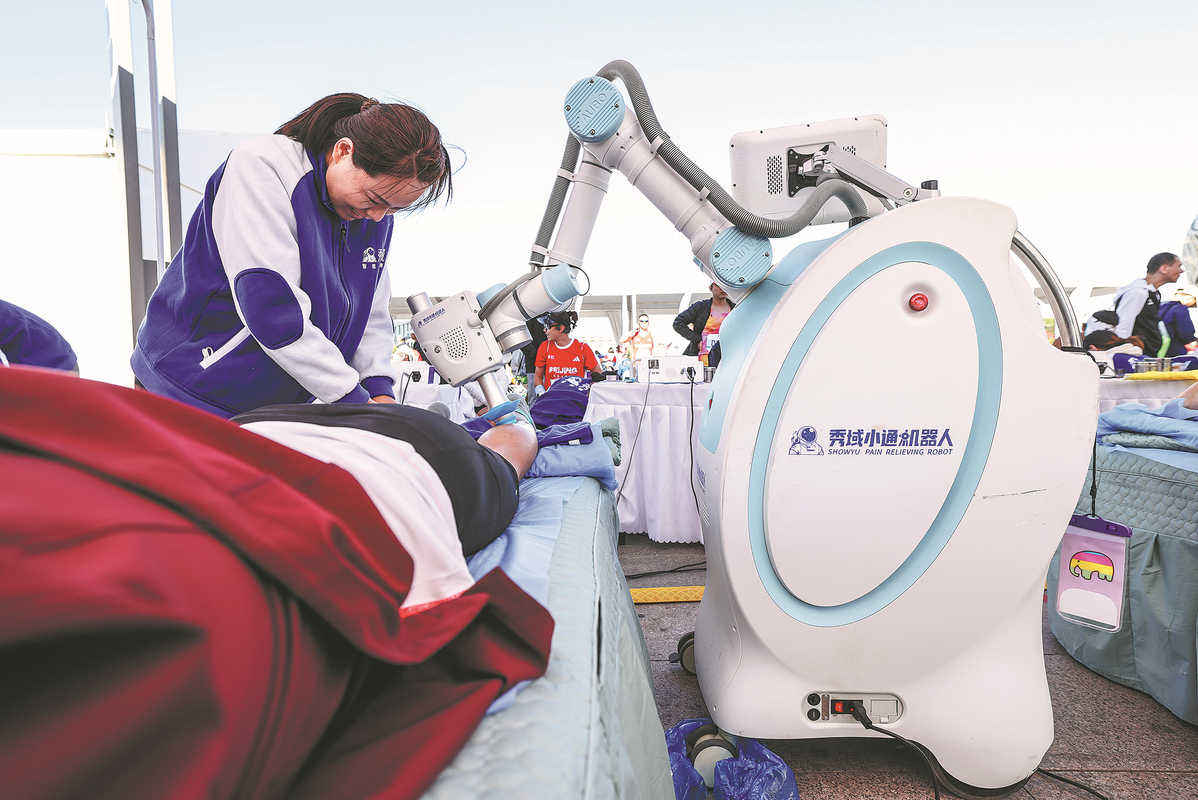Rehab industry surges to overcome growing pains
More office workers, young people seeking physical therapy for injuries, aches


Demand for services
In the summer of 2022, Wang Chenfei injured his right knee while playing with a Frisbee.
After undergoing surgery at Beijing Jishuitan Hospital, one of the city's top medical facilities for treating bone fractures and sports injuries, he was dissatisfied with his rehabilitation program.
"The hospital sent a rehabilitation doctor from the rehabilitation department to assist me after my surgery. However, they only taught me some basic movements," said Wang, adding the "generic" guidance seemed inadequate.
"Rehabilitation is a time-consuming and labor-intensive process that requires a tailored approach. Each person's situation is different. The basic guidance on exercise was far from sufficient for someone like me who wanted to recover their physical abilities to resume doing sports," he added.
Wang decided to visit a Reborn clinic twice a week for guidance on rehabilitation and physical improvement.
Chen, from Reborn, recalled his time working as a rehabilitation therapist at a hospital a decade ago. He said he attended to dozens of patients a day, with the average outpatient consultation lasting no more than 10 minutes.
"The hospital's high patient volume created a significant imbalance between supply and demand, which forced the rehabilitation department to follow an assembly-line approach, making effective one-on-one guidance difficult," Chen recalled.
The development of rehabilitation medicine in China began in the 1980s, lagging more than 60 years behind developed countries such as the United States and Canada. It gradually gained public attention following the 2008 Beijing Summer Olympics.
Around 2012, the concept of sports rehabilitation began to gain traction in China, leading to the emergence of the first rehabilitation clinics.
Chen's rehabilitation center was established in 2016, coinciding with the rising public interest in scientific exercise. Now Reborn has seven rehab centers in five cities, including Beijing, Shanghai and Shenzhen, Guangdong province.
Over the past five years, the introduction of two major national strategies — the National Fitness Plan and the Healthy China 2030 Initiative — has shifted sports rehabilitation from a niche market focused on professional athletes to a broader one that serves sports enthusiasts and the general public.
According to statistics from the Sports Rehabilitation Industry Alliance, there were approximately 100 sports rehabilitation facilities nationwide in 2018, which increased to 370 in 2020.
Despite a slowdown in industry growth over the past three years, the number of branches doubled to reach 750 last year.
However, Mi Zhongxiang, deputy director of the China Rehabilitation Research Center (Beijing Boai Hospital), said at an industry symposium last year that compared with the demand for rehabilitation, "our current supply of rehabilitation can be described as a drop in the bucket".
There are 2.2 rehabilitation physicians and 4.3 therapists per 100,000 people in China, official data shows.
In 2021, the National Health Commission released a document to promote the development of rehabilitation medical services, setting a target of eight rehabilitation physicians and 12 rehabilitation therapists per 100,000 people by 2025.
Market potential
Even if this level of coverage is achieved, China's rehabilitation industry still has a significant gap to developed countries.
The targets fall below the international standard of having 15 or more physicians and eight to 10 therapists for every 100,000 people.
"In Canada, rehabilitation clinics are almost ubiquitous. You can easily find one every block or two," said sports rehab expert Li Yimeng, highlighting that locals have a strong awareness of rehabilitation and actively seek help from sports rehabilitation clinics after injuries.
Li studied sports rehabilitation during her undergraduate years in Beijing and later pursued a master's degree in physical therapy in Hong Kong and Canada.
She worked at one of the earliest rehabilitation institutions in China until 2019 before transitioning to a career in sports rehabilitation in Canada in 2022.
She believes that raising public awareness about rehabilitation and having strong support from the healthcare insurance system is crucial for the success of sports rehabilitation in China.
"Even in major cities like Beijing, Shanghai, and Guangzhou (Guangdong), let alone second- or third-tier cities or even smaller areas, many people still cling to the outdated belief that they should remain immobile after an injury," said the 32-year-old, who is now working as a physiotherapy assistant in Alberta, Canada.
However, with the increase in public awareness about rehabilitation in recent years, Chen is confident about the development of the rehabilitation industry in China.
Market advisory group KPMG forecast the market size of the rehabilitation medicine industry in China would grow at an annual rate of 20.9 percent from 2020 to 2025.
By 2025, the market size is projected to exceed 200 billion yuan, said the company.
In addition to managing his clinic, Chen also shares informative videos on rehabilitation and pain prevention and alleviation, on the Chinese social media platform Xiaohongshu.
For instance, he provides tips for office workers on alleviating lower back pain after long hours of sitting. With nearly 200,000 followers, his videos have garnered over 1 million likes.
"Recently, a popular saying has emerged online: 'The end of fitness is rehabilitation'. In fact, the fitness journey can also begin with rehabilitation," said Chen.
"Before starting a regular exercise routine, it's beneficial for everyone to visit the rehabilitation department of a hospital or a qualified rehabilitation clinic for a physical assessment. This can help individuals better understand their physical condition and plan their exercises in a scientific and reasonable way," he said.
zhaoruinan@chinadaily.com.cn
























